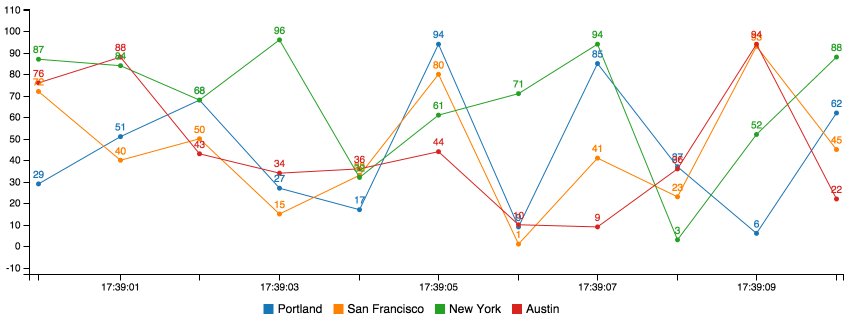Realtime animated graphs with PubNub and C3.
<script type="text/javascript" src="https://pubnub.github.io/eon/v/eon/1.0.0/eon.js"></script>
<link type="text/css" rel="stylesheet" href="https://pubnub.github.io/eon/v/eon/1.0.0/eon.css"/>bower install eon-chart --saveCheck out our bower example.
npm install eon-chart --saveCheck out our webpack example.
Plug your normal C3 config into the generate param. Supply an array of PubNub channel in channels param. eon.chart returns the normal C3 chart object.
<div id="chart"></div>
<script>
var pubnub = new PubNub({
publishKey: 'demo', // replace with your own pub-key
subscribeKey: 'demo' // replace with your own sub-key
});
eon.chart({
pubnub: pubnub,
channels: ["c3-spline"],
generate: {
bindto: '#chart',
data: {
labels: true
}
}
});
</script>That's it! Now you can publish messages to the same channel and they'll render in the graph.
var pubnub = new PubNub({
publishKey: 'demo', // replace with your own pub-key
subscribeKey: 'demo' // replace with your own sub-key
});
setInterval(function(){
pubnub.publish({
channel: 'c3-spline',
message: {
eon: {
'Austin': Math.floor(Math.random() * 99),
'New York': Math.floor(Math.random() * 99),
'San Francisco': Math.floor(Math.random() * 99),
'Portland': Math.floor(Math.random() * 99)
}
}
});
}, 1000);All chart data must exist within an object called eon. Also notice how the channel and channels matches in both examples.
| Parameter | Value | Default |
|---|---|---|
| channels | An array of PubNub channels to subscribe to. Either channels or channelGroups must be supplied. |
false |
| channelGroups | An array of PubNub channel groups to subscribe to. Either channels or channelGroups must be supplied. |
false |
| generate | Your C3 chart generation config. | undefined |
| flow | Used to update spline charts over time series. | false |
| limit | The size of your buffer. How many values to display on the chart before shifting the first value off and appending a new value. This is not native to C3. | 10 |
| rate | Interval at which new datapoints are drawn on the chart in milliseconds. | 1000 |
| history | Fill the buffer by using PubNub history call to retrieve last limit messages. Requires PubNub storage to be enabled. |
false |
| xType | Your x axis configuration. Can be "auto", "custom", or false. Read more about xType below. |
"auto" |
| xId | Your x axis source if xType == "custom" |
"x" |
| message | A function to call everytime a PubNub message is recieved. See PubNub subscribe | function(message, env, channel){} |
| transform | Method for changing the payload format of your stream. See example | function(m){return m} |
| connect | A function to call when PubNub makes a connection. See PubNub subscribe | function(){} |
| pubnub | An instance of the PUBNUB javascript global. This is required when using your own keys. See the subscribeKey example. |
false |
| debug | Log EON events to console as they happen | false |
This uses the included PubNub library to pubnub.publish() packets to the pubnub.subscribe() call waiting inside the C3 framework.
You probably want to publish data from the back-end instead. Check out our docs for more info:
http://www.pubnub.com/documentation/
eon-chart works will all supported graph types in C3. Just check out the examples above.
You can learn more about customizing your graph from the official C3 docs.
eon-chart will automatically use the PubNub message timestamp for chart x values. This timestamp is recorded when a message is published to the PubNub data stream network. This is the case when xType is set to "auto".
If you'd like to supply your own Javascript timestamp, set xType to custom. Then, set xId to the x value that appears within your published messages. Any custom x must be a microtime date like 1465417017340.
var pubnub = new PubNub({
publishKey: 'demo', // replace with your own pub-key
subscribeKey: 'demo' // replace with your own sub-key
});
eon.chart({
pubnub: pubnub,
channels: ["c3-spline"], // the pubnub channel for real time data
generate: { // c3 chart object
bindto: '#chart'
},
xType: 'custom',
xId: 'x'
});Notice how the code below publishes a key value pair called x with every message.
pubnub.publish({
channel: 'c3-spline',
message: {
eon: {
'x': new Date().getTime(),
'Austin': Math.floor(Math.random() * 99)
}
}
});It is possible to publish multiple plot points per payload. Rather than using the object name eon use the name eons and supply an Array. Because you use the eons property name, the library will know to loop through the array and plot each point.
Note that if publishing multiple points per payload, you must use xType: "custom" and supply an xId.
eons: [
{
x: new Date().getTime(),
value: 1
},
{
x: new Date().getTime(),
value: 2
}
] Here's an example of data collected at 100ms increments, but only publishes every 1,000ms. Every payload includes 10 points with 100ms resolution. See a full example here.
setInterval(function(){
var data = [];
var date = new Date().getTime();
for(var i = 0; i < 10; i++) {
data.push({
'pub_time': date + (100 * i),
'Austin': Math.floor(Math.random() * 99)
});
}
pubnub.publish({
channels: [channel],
message: {
eons: data
}
});
}, 1000);You can disable eon-chart modifications by setting xType to false. By default C3 will use an incremental x axis (1,2,3,4...).
You can publish from multiple sources into one chart. For example, you can graph the individual memory usage from 3 servers by supplying the same channel to your PubNub publish requests.
Check out our distributed chart example.
